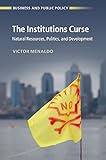The institutions curse : Natural resources, politics, and development / Victor Menaldo, University of Washington.
Publisher: Cambridge, U.K. ; New York : Cambridge University Press, 2016Description: xiii, 401 pages : illustrations ; 23 cmContent type:- text
- unmediated
- volume
- 9781107138605 (hardback)
- 9781316503362 (paperback)
- 338.9009 MEN 23
- HC59.7 .M435 2016
- POL023000
| Item type | Current library | Shelving location | Call number | Status | Date due | Barcode |
|---|---|---|---|---|---|---|
 BOOKs
BOOKs
|
National Law School | MPP Section | 338.9009 MEN (Browse shelf(Opens below)) | Available | 36061 |
Table of contents
1. Introduction
2. Three puzzles and some building blocks;
3. Intellectual heritage of the institutions curse view;
4. The institutions curse;
5. Not manna from heaven after all: the endogeneity of oil;
6. The resource blessing;
7. Whither the Arab Spring?;
8. Conclusions.
"The "resource curse" is the view that countries with extensive natural resources tend to suffer from a host of undesirable outcomes, including the weakening of state capacity, authoritarianism, fewer public goods, war, and economic stagnation. This book debunks this view, arguing that there is an "institutions curse" rather than a resource curse. Legacies endemic to the developing world have impelled many countries to develop natural resources as a default sector in lieu of cultivating modern and diversified economies, and bad institutions have also condemned nations to suffer from ills unduly attributed to minerals and oil. Victor Menaldo also argues that natural resources can actually play an integral role in stimulating state capacity, capitalism, industrialization, and democracy, even if resources are themselves often a symptom of underdevelopment. Despite being cursed by their institutions, weak states are blessed by their resources: greater oil means more development, both historically and across countries today"-- Provided by publisher.
"For decades, parallel literatures in political science and economics have blamed natural resources for several pathologies. The extraction, transportation, and export of hydrocarbons and minerals are believed to vitiate the rule of law and jeopardize property rights. They therefore hinder economic diversification and retard economic growth. Instead, they stimulate unproductive rent seeking and foment corruption. This fuels civil strife, promotes authoritarianism, and exacerbates gender inequality"-- Provided by publisher.

There are no comments on this title.